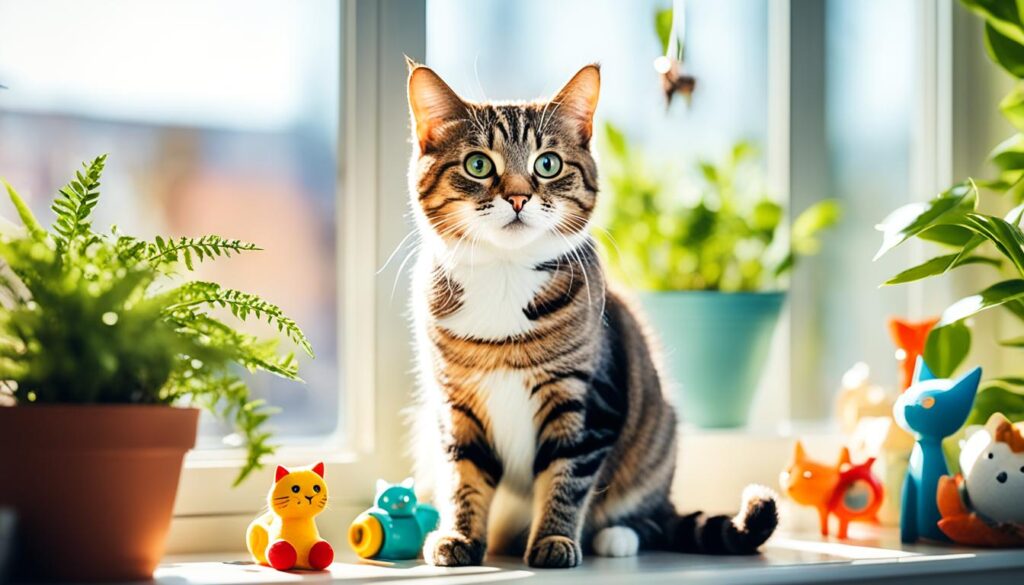Boost your pet’s wellness
Boost your pet’s wellness:tips for happy animals:Keeping your furry friend healthy is key for every pet owner today. This guide offers tips to boost your pet’s well-being and happiness. You’ll learn how to improve their diet, exercise, and even their behavior.
By following these tips, your pet will stay healthy and happy. It’s all about making sure they get the right care and attention they need.
Key Takeaways
- Understand the importance of pet wellness and the benefits of a healthy pet
- Discover nutritious diet options to support your pet’s overall health
- Encourage physical activity and explore fun activities for different pet types
- Establish a regular grooming and hygiene routine to maintain your pet’s well-being
- Prioritize preventive veterinary care and early detection of potential health issues
Importance of Pet Wellness
Keeping our pets healthy is key to caring for them. Pet wellness means looking after their physical, mental, and emotional health. It helps our pets live better lives and strengthens our bond with them.
Benefits of a Healthy Pet
Healthy pets are happier and bring more joy to our lives. They get sick less often, have lots of energy, and live longer. Taking good care of our pets means we can spend more years with them, making memories and deepening our connection.
Factors Influencing Pet Well-being
- Proper nutrition and a balanced diet
- Regular exercise and physical activity
- Routine veterinary check-ups and preventive care
- Grooming and maintenance of good hygiene
- Providing a stimulating and enriching environment
- Addressing behavioral and mental health needs
These things are key to our pets’ well-being. By focusing on them, we help our pets live better lives.
“The health of pets is not only important for their own well-being but also for the happiness and fulfillment of their human companions.”
Looking after our pets’ wellness shows we care deeply. By focusing on their health and happiness, we build a strong bond that benefits everyone.
Nutritious Diet for Pets
Keeping your pet’s diet balanced and rich in nutrients is crucial for their health. High-quality pet nutrition is key to giving your furry friend the vitamins, minerals, and macronutrients they need. From top-notch pet foods to specific pet supplements, a complete nutrition plan is essential for your pet’s health and long life.
When thinking about pet nutrition, it’s important to choose foods made for your pet’s age, breed, and how active they are. Talking to a vet can help pick the best pet food and supplements for your pet. High-quality, right-for-your-pet nutrition boosts their immune system, keeps a healthy weight, and supports their overall health.
| Pet Nutrition Considerations | Key Benefits |
|---|---|
| Balanced Macronutrients (Protein, Fats, Carbohydrates) | Supports Muscle Growth, Energy, and Overall Health |
| Essential Vitamins and Minerals | Promotes Healthy Skin, Coat, and Organ Function |
| Species-Specific Formulations | Tailored Nutrition for Unique Dietary Needs |
| High-Quality Pet Supplements | Addresses Specific Nutritional Deficiencies or Health Concerns |
Choosing a well-balanced, high-quality pet nutrition plan is key to your pet’s long-term health and happiness. Work with your vet to create the best feeding plan for your pet’s needs and well-being.
“A healthy diet is the foundation for a healthy pet. Investing in premium pet foods and supplements can make all the difference in your companion’s quality of life.”
Encouraging Exercise and Activity
Keeping your pet active is key to their happiness and health. Regular exercise boosts pet fitness and shapes pet behavior. This guide offers fun activities for different pets, keeping them happy and healthy.
Fun Activities for Different Pet Types
Variety is important for pets too. Here are some great exercise options for your pet:
- Dogs: Go for walks, hikes, or jogs with your dog. Use toys like frisbees, balls, and puzzle feeders for fun and brain work.
- Cats: Give them a cat tower or scratching post. Play with dangling toys, laser pointers, or hide-and-seek games.
- Small Pets: Use a big hamster wheel or a playpen for them to explore and move around.
It’s important to match activities with your pet’s needs and likes. This keeps them active, happy, and well.
“A tired pet is a happy pet. Engaging your furry friend in regular physical and mental activities is the secret to a healthy and well-balanced companion.”
Adding these fun exercises to your pet’s daily routine strengthens your bond. It also helps their overall health. A happy, healthy pet is a joy, so put exercise first in their life.
Pet Wellness
Keeping your pet well involves more than just their health. It’s about nutrition, activity, grooming, vet care, and making their home better. Understanding all these parts helps make sure your pet is happy and healthy.
Holistic Approach to Pet Wellness
Pet wellness covers their physical, mental, and emotional sides. A good pet wellness plan includes:
- Balanced and nutritious diet
- Regular exercise and playtime
- Proper grooming and hygiene routines
- Preventive veterinary care and regular check-ups
- Stimulating and enriching living environment
- Stress management and behavior training
By focusing on these areas, your pet can live a happy and healthy life.
Monitoring Pet Health Indicators
It’s important to watch your pet’s health closely. Look for signs like:
- Coat condition and shedding patterns
- Appetite and hydration levels
- Energy levels and activity patterns
- Bowel movements and litter box habits
- Dental health and breath odor
Knowing these signs helps you spot problems early. This means you can get your pet the care they need to stay well.
| Wellness Aspect | Key Considerations |
|---|---|
| Nutrition | Balanced, species-appropriate diet, regular feeding schedule |
| Exercise | Appropriate physical activity for the pet’s age and breed |
| Grooming | Regular bathing, brushing, nail trimming, and dental care |
| Veterinary Care | Preventive check-ups, vaccinations, and prompt treatment of illnesses |
| Environment | Comfortable, stimulating, and safe living space |
| Behavior | Positive reinforcement training, stress management, and socialization |
By focusing on these key areas, you can help your pet stay healthy, happy, and live a long life. A holistic approach to pet wellness is key to a strong bond with your pet.
Grooming and Hygiene Routines
Keeping your pet clean is key for their comfort, looks, and health. Regular grooming does more than make your pet look good. It also helps prevent health problems.
Importance of Regular Grooming
Grooming is crucial for your pet’s health. It includes brushing, bathing, and trimming nails. These activities help:
- Stop fur from matting and causing skin irritation
- Remove dirt and extra hair for healthy skin and fur
- Spot skin issues or parasites early
- Help keep teeth clean and stop tartar buildup
- Keep paws and nails in good shape
Having a regular grooming routine keeps your pet clean, comfy, and healthy.
| Grooming Task | Frequency |
|---|---|
| Brushing | 1-3 times per week |
| Bathing | Every 4-6 weeks |
| Nail Trimming | Every 4-6 weeks |
| Ear Cleaning | Monthly |
Your pet’s grooming needs depend on their breed, fur type, and unique traits. Talk to a vet or a professional groomer to find the best pet grooming and pet hygiene plan for your pet.
Veterinary Care and Check-ups
Proactive veterinary services and routine check-ups are key to your pet’s health. These visits help keep your furry friend healthy and catch problems early. This way, your pet can get the care they need before things get worse.
Preventive Care and Early Detection
Preventive pet health steps are vital for a good life for your animal. Every year, check-ups let vets spot and fix problems early. They give shots and treatments to keep your pet safe and healthy.
- Vaccinations to protect against common diseases
- Parasite screenings and prevention
- Dental cleanings and oral health assessments
- Nutritional guidance and weight management
- Behavior evaluations and training recommendations
By focusing on animal care and regular check-ups, your pet can live a long, happy life. Early action by vets is key to solving problems fast and keeping your pet well.

“Regular veterinary check-ups are an investment in your pet’s future health and happiness.”
Enriching Environment for Pets
Creating a rich environment is key for our pets’ happiness. It meets their natural needs and helps them feel at home. This approach supports their pet behavior and animal care.
Interactive toys and activities are vital for an enriched space. Think puzzle feeders, scratching posts, and climbing structures. These items keep pets active and sharp, making them healthier and happier.
It’s also crucial to have a cozy and safe spot for your pet. Offer soft beds or places to hide. Make sure they have room to move, whether it’s a big enclosure or a big yard.
“A happy pet is a healthy pet. By creating an environment that caters to their unique needs, we can ensure our companions thrive and flourish.”
Adding new sights, sounds, and smells is important too. Change their toys, add new plants, or play calming music. This keeps them curious and relaxed.
The aim is to make a space that feels like their natural home. It should offer chances for play, rest, and discovery. By doing this, you’ll improve your pet’s pet behavior and strengthen your bond. It makes for a better animal care experience for both of you.
Stress Management and Behavior Training
Keeping a pet happy goes beyond just their health. It’s important to focus on pet behavior and stress management. By understanding what causes bad behavior and using stress-reducing methods, pet owners can make life better for their pets.
Addressing Behavioral Issues
Sometimes, pets act out in ways like barking too much, chewing things they shouldn’t, or being anxious. To fix these issues, it’s key to find out why they’re acting this way. Work with a pet behavior expert or a vet for advice and training plans.
- Observe and identify the trigger behaviors
- Implement positive reinforcement training techniques
- Establish a consistent daily routine and structure
- Provide sufficient physical and mental stimulation
- Consult with a professional for complex behavioral issues
By tackling pet behavior problems early, pet owners can make a safer and happier home for their pets. This ensures their pets stay well and happy over time.
Stress Management Strategies
Pets can get stressed from things like changes at home, feeling left out, or meeting a new family member. Knowing when your pet is stressed and using the right strategies can make them feel better. This helps them stay calm and relaxed.
- Provide a comfortable and secure living space
- Establish a consistent daily routine and minimize disruptions
- Engage your pet in regular exercise and playtime
- Use calming pheromone diffusers or supplements, if recommended by a veterinarian
- Seek professional help for severe or persistent stress-related issues
By working on pet behavior and stress, pet owners can create a safer and more peaceful home. This ensures their pets stay happy and well for a long time.

“A well-adjusted, stress-free pet is more likely to exhibit positive behaviors and enjoy a fulfilling life with their owner.”
Conclusion
In this guide, we’ve looked at key ways to keep pets healthy and happy. We talked about the need for good food, exercise, vet care, and managing stress. These strategies help you care for your pet well.
By focusing on pet wellness, pet health, and animal care, you build a strong bond with your pet. This creates a great environment for them to flourish. Taking care of our pets is a team effort. By being proactive, we make sure they live long, healthy lives with us.
As you keep caring for your pet, remember the advice and tips from this article. Keep using them every day. With a focus on your pet’s wellness, you can enjoy many happy years together. These years will be filled with love and companionship.

